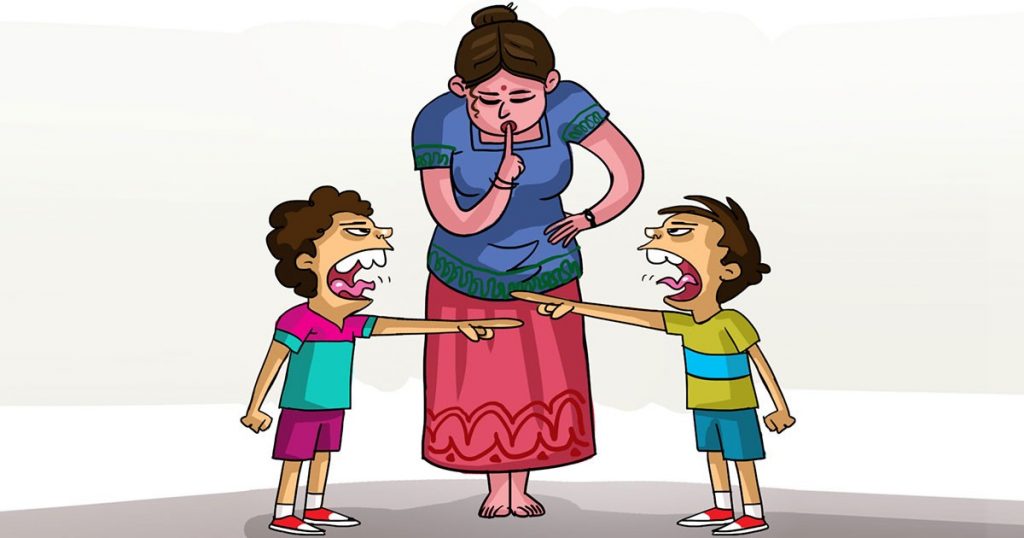Sibling rivalry is the jealousy, competition and fighting between brothers and sisters to score one over the others. It is a concern for almost all parents of two or more kids. Sibling rivalry is healthy if it works for creating some good results; like to prove superiority one child scores better marks in exams, or just to prove superiority a child masters an art… etc. But, at many times the sibling rivalry can become a serious thing; many children carry the hurt, pain, jealousy in long run even after they grow as adults. Siblings are supposed to be close, to be friends. They are supposed to help each other; they are supposed to protect each other in difficult times. Problems often start right after the birth of the second child.
Statistically, sibling rivalry is indeed quite normal. However, even if it is thought so, there is nothing normal or healthy about it. The sibling feuds got their start in Bible: Cain and Abel were the sons of Adam and Eve but didn’t exactly see the newly created world in the same way. In the Bible, Cain (the firstborn) murders his brother Abel when the Lord favors Abel’s sacrifice over Cain’s. They had a rocky relationship that culminated in a heated quarrel. There are many real life examples: the Andrew Sisters – LaVerne, Maxene, and Patty who worked together to top the charts as a trio singing group, the sisters reportedly refused to speak to one another offstage. Later, Patty even joined another group without telling the other sisters. But LaVerne and Maxene got their sweet revenge when Patty’s solo act was disparaged.
This is a genuine sibling rivalry. The fight goes all the way back to the sibling founders of both companies. In the 1920s, German brothers Adolf and Rudolf Dassler created a shoe company together in their mother’s laundry room. As business boomed, so did the stress and hatred between them. WWII (World War II) officially split them up, and Adolf started Adidas, while Rudolf created Puma. Both are world-famous shoe companies.
In one of the extensive research carried on the topic, researchers involved in the study have found that sibling rivalry is often filled with psychological and physical aggression, which can traumatize children, leading to higher instances of depression, anxiety, and anger later in life. In fact, sibling aggression may be more detrimental than bullying. One research goes on to prove that the feud starts with proving leadership traits. A new study on the long-term effects of negative communications between siblings has garnered some surprising results. Researchers have found that sibling rivalry is often filled with psychological and physical aggression, which can devastate children, leading to higher instances of depression, anxiety, and anger later in life. At times sibling aggression may be more damaging than bullying, https://www.opaortho.com/xanax-treating-anxiety/.
According to clinical psychologist Dr. John Caffaro, sibling violence is the most common form of family violence, occurring far more commonly than parental or spousal abuse. Some studies have estimated that nearly half of all children with siblings have suffered physical violence such as bites, kicks, and punches, while nearly 15 percent of those have been attacked repeatedly and killed.
The Effects of Sibling Rivalry can be breathtakingly nasty. The Indian music industry was for many decades ruled by two Mangeshkar sisters. While Lata Mangeshkar made her mark earlier than her sister, Asha who was a struggling singer back then. However, with changes and revolution in music, O. P. Nayyar gave her new success, and Asha was chosen for the new genre of music, after which she delivered many hits. Though the industry talked much about their sibling rivalry, the sisters rubbished such claims.
We have seen rivalry between siblings actively involved in family-owned businesses. It takes two different forms: emotional and strategic. To find solutions to resolve conflicts among brothers and sisters in family businesses, one must first determine if the rivalry is emotional or strategic, or some combination of both. A family business is started, for years run by the founder who knows every detail in every action that exists to make it work. When his/her children enter the business they are tested and scrutinized in every way by the parent, the senior managers and the employees. Their acumen is determined in different ways. The moment of truth is upon them as they prepare to take their place in the business: Who is best suited to take over?
The wicked Indian corporate rivalry case from the Ambani family has always been in the news. After their father’s death in 2002, the business tycoon who built this successful business empire, the two brothers Mukesh and Anil had their fair share of differences over running the empire. Their differences have been so serious that Reliance Group was split between both of them. Since then, the dirty war between them has showed its aftermath: with the brothers even accusing each other of unethical practices in business. Unfortunately, this type of sibling aggression can doom the business simply.
Parents may feel like it’s okay for kids to fight things out, but the effects of sibling abuse can persist into adulthood, causing emotional issues and even self-sabotage later in life. When siblings are found fighting physically or humiliating each other, parents need to intervene and teach proper conflict resolution skills. Effective parenting is most important. It helps the child function in society effectively, the child grows confident. Children need to be fed, clothed and have a roof over their heads. This is the bare minimum, the basic physiological needs. But they also need love, support, boundaries, and guidance to be valued to grow emotionally, intelligently and rationally in life. The child needs to be listened to. These things allow a child to take risks and test limits at the same time as still remaining safe. Most important fact is that parenting does not come with a manual. And, equally another fact is that child is the mirror image of its parents.















































